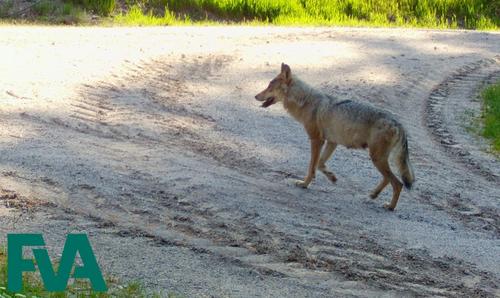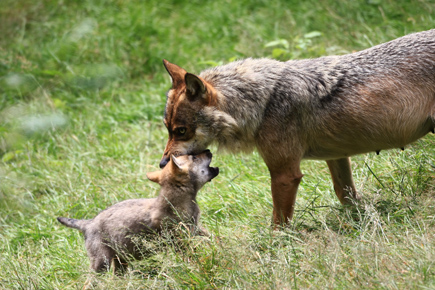++ Photo trap image from the community of Schluchsee provides evidence of offspring ++ First wolf pack in over 150 years in Baden-Württemberg ++

The active mammary glands are clearly visible on the female. She migrated from Lower Saxony to Southern Germany just last winter. Not too long a distance for wolves.
© Forstliche Versuchs- und Forschungsanstalt Baden-Württemberg
Wolfes are very social animals and caring parents.
© Jörg PukownikFreiburg, Radolfzell. Joyful news with historic significance: After more than 150 years, there is again wolff offspring in Baden-Württemberg. A photo trap image of 6 June shows a female wolf with clearly visible teats (active mammary glands). Thus, the assumption that reproduction may be possible after the immigration of a female in the past winter in the area around the Schluchsee, has been confirmed. Wolves have been living in the Black Forest again for several years - but only males until last winter.
EuroNatur welcomes the return of the large carnivores to Baden-Württemberg and warns against scaremongering in view of the young wolf family: "As the top link of the food chain, the wolf fulfills a crucial role in the ecosystem. Its return positively impacts on the biodiversity of our forests and cultural landscapes", says Antje Henkelmann, project manager for wolf conservation at EuroNatur. "At the same time, we take the local people's concerns seriously."
To ensure that shepherds are well prepared for the return of the wolves, EuroNatur is working with other stakeholders from Baden-Württemberg to promote effective herd protection and is a member of the "Trägergemeinschaft Ausgleichsfond" (compensation fund for wolf damage). "Farmers continue to need financial and professional support", says Gabriel Schwaderer, Excecutive Director of EuroNatur. "Livestock protection is the basis for a peaceful co-existence of wolves, grazing animals and people. Experience from other parts of Europe, where there are far more wolves than in our region, clearly shows that herd guarding measures make predation on farm animals decrease."
Background Information:
- Wolf offspring: Wolves give birth to an average of four to six pups, which are born in late April, early May. When born, they are deaf, blind and just weigh half a kilo. They leave their den for the first time after about three weeks. At the age of six to seven months, the pups are then almost as large as adult wolves and run along with the other pack members.
- Wolf compensation fund: To enable the peaceful coexistence of wolves, humans and farm animals, the state of Baden-Württemberg created a "Management Plan Wolf" to which the nature and hunting associations contributed. The nature conservation associations BUND BW, EuroNatur, LNV, NABU BW and ÖJV have founded, with the Ministry of Environment, a compensation fund for wolf damage where wolves have killed farm animals. With this, the associations want to contribute to a better acceptance of the wolf.
Select on which of your areas of interest you would like to receive our press releases.
You can subscribe to our RSS feeds to receive all the news on the topics of your choice.


